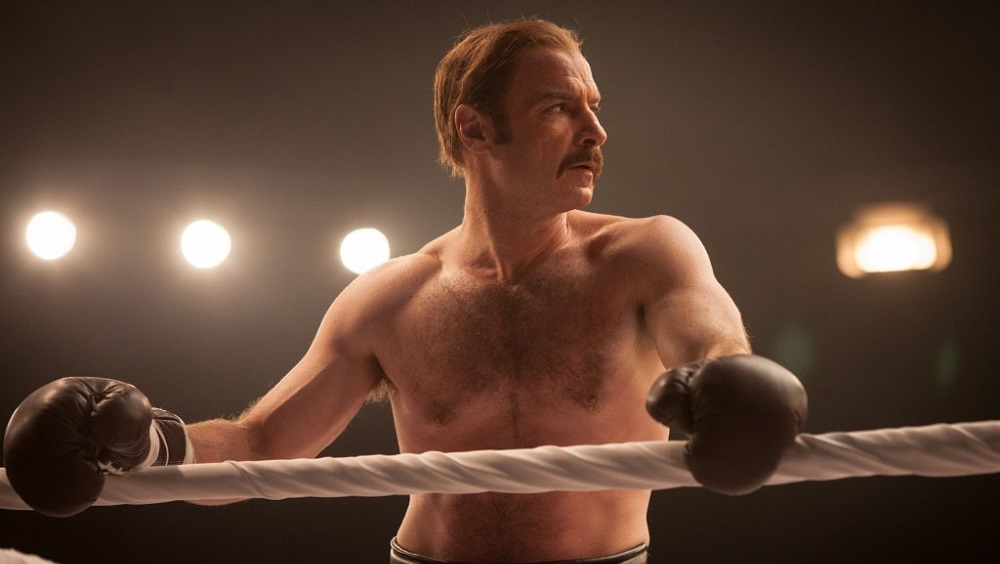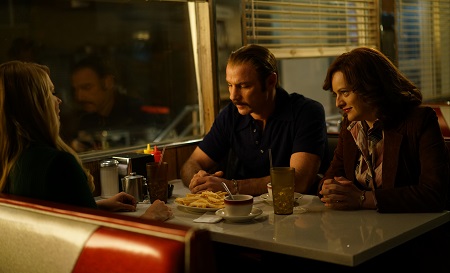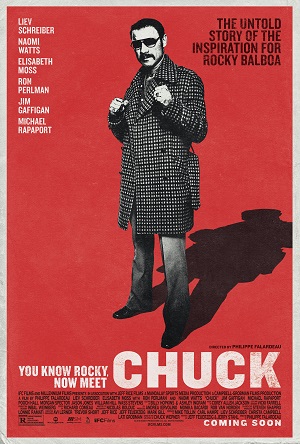
Schreiber’s Charming Chuck Star-Turn a Pugilistic Knockout
Even though he was the heavyweight boxing champion of New Jersey, even with eight straight wins sitting on his resume, no one could have predicted it would be Chuck Wepner (Liev Schreiber) who would be selected to fight Muhammad Ali (Pooch Hall). Recently crowned the new Heavyweight Champion of the World thanks to his rope-a-dope pummeling of George Foreman, Ali could have selected any number of challengers to be the first man he’d defend his title against. For whatever reason, Wepner was the guy, this barely known liquor salesman from Bayonne getting a million-to-one title shot against a man many considered impossible to knock down let alone defeat.
The rest of the story is fairly well known. While Wepner did not win the fight, he did become the first man to knock Ali to the canvas, the enraged champion rising to send his challenger packing just 19 seconds into the 15th round. But, not only did lasting almost until the end of the fight make the boxer, known in and around New Jersey as the “Bayonne Bleeder,” something of a folk hero and celebrity, his underdog stance also inspired Sylvester Stallone to write the script for his Academy Award-winning classic Rocky. Wepner became famous all over the world, and if this was where his story ended it would difficult not to feel as if he’d up and lived something akin to a fairy tale.
Watching Chuck, it’s clear the boxer’s story did not end there, and like most fairy tales, the real life variation isn’t always uplifting nor is it capable of being viewed through rose-colored glasses. For every success he created Wepner managed to construct just as many failures, his insistent philandering resulting in the alienation of his only daughter and the ending of his marriage to first wife Phyliss (Elisabeth Moss), while an impromptu introduction to cocaine blossomed into a full-blown addiction that caught the eye of New Jersey authorities.
This is the story director Philippe Falardeau’s (Monsieur Lazhar, The Good Lie) good-natured sports melodrama chooses to tell, doing so with an oddly optimistic determination. Anchored with panache and acres of masculine magnetism by Schreiber (who also produced the film and helped co-write the script, making this a rather obvious labor of love), the movie’s general ebullience is something of a genuine surprise. As many dark turns as the Bayonne Bleeder’s story takes, there’s just something about the way he’s depicted here that led me to believe he would find a way to come out on top, Falardeau’s film not exactly going out of its way to sow any seeds of doubt as far as those expectations were concerned.
From a structural standpoint, because of these continuous jolts of levity and hope, it is admittedly difficult for the narrative to generate feelings of tension or suspense. Even as his marriage disintegrates and cocaine and alcohol abuse begin to grab hold of the boxer in ruinous fashion, things remain so light and sprightly the full weight of what is going on is never felt. There’s no suspense, no air of danger, and even when prison becomes a real possibility, and not knowing anything about what Wepner went through during the 1980s, never did I doubt he’d find a way to pull himself back off the mat and get his life back in some semblance of working order.
While far from Schreiber’s best work, the actor still delivers such a magnetic, enchantingly amiable star-turn as Wepner the overall spell he cast upon me was one I utterly adored. He’s the film’s heart and soul, delivering a rich, full-bodied portrait of this pugilistic everyman that’s wonderful. Moss is also excellent (if underutilized), while Ron Perlman appears to be having a blast popping in and out as Wepner’s trainer, manager and friend Al Braverman. Naomi Watts also makes the most of her limited screen time as a bartender who captures the boxer’s affections, her delivery of some stark, unvarnished truth to her floundering wannabe paramour packing a cold, refreshingly brutal punch the movie could honestly have used a little bit more of.
Be that as it may, much like the man himself Chuck is almost impossible to dislike. Falardeau directs with the same sort of undemanding, bare-naked resilience as the boxer he is depicting showcases in the ring, allowing Schreiber the requisite freedom to build his character with a loosey-goosey effervescence that’s irresistible. While not a knockout, the film still manages to finish the fight victorious, and even if it’s something of a split decision that still makes the picture a bona fide winner I’m happy to stand up and cheer for.
Film Rating: 3 (out of 4)








